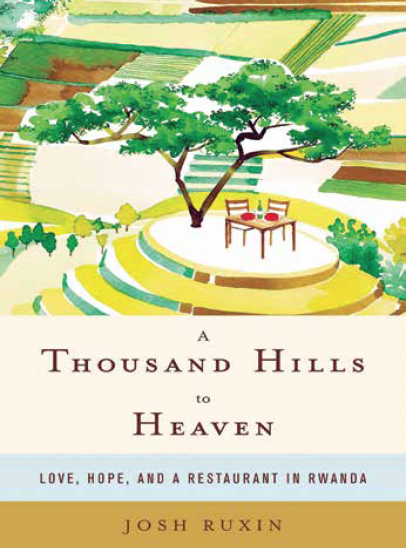Edible Reads: A Thousand Hills to Heaven
I have worked in restaurants for 35 years. During that time I have seen more than enough to scare a person out of the business. There were fires and near-fires and explosive fire suppression systems. There were the two separate times I took coworker’s thumbs to the hospital for them. There was the guy who slipped while cleaning the exhaust hood and dunked his foot in the deep fryer. He wore nylon socks that melted to
his foot.
These are the sorts of stories any American cook who has made his bones can tell.
And they are nothing.
They are nothing because in all the towns I have cooked in, and there are something like eight of them, no one was being hacked to death with machetes on the street.
Please understand: Josh Ruxin’s book, A Thousand Hills to Heaven: Love, Hope, and a Restaurant in Rwanda, is not about the genocide that occurred there 20 years ago this April, but that background is unavoidable. It is a background that brings stark relief to Ruxin’s efforts to bring health and hope to Africa. He is so devoted to the effort that he and his new bride picked up and moved from their privileged life in New York City and settled in Kigali, where they are now raising three children.
It is difficult, in the best of circumstances, build a restaurant from the ground up. But imagine doing so with a team of people that had never even eaten in a restaurant, let alone worked in one – a team of people whose families had been killing each other within their living memories.
Any successful chef is adept at building teams, and maintaining them despite the usual distractions. Exhuming the bones of a genocide victim from your back yard could not be considered “usual,” though, even in Rwanda. Try explaining that to your team, let alone to your three small children.
Of course none of this sprang from nowhere. Mr. Ruxin and his wife Alissa were heavily invested in doing charitable work with NGO’s ever since a conversation at a swanky rooftop cocktail party in New York made them think beyond the normal Peace Corps-like volunteer work. Alissa had a doctorate in public health, after all, and a soft spot for jungle.
Josh too was in the public health world, running and expanding health management assistance in Kenya, Nigeria, and Ethiopia, and co-chairing the UN Millennium Project’s task force on AIDS. It was at the aforementioned cocktail party, just a few days before the Ruxins were to wed, that a man named Stephen Lewis (an advocate for Africa who would go on to become Rwanda’s health minister) asked a simple question: “Why in the world aren’t you doing a Millennium Village in Rwanda?” He went on to talk of the high-reaching hopes of his people, despite the past troubles and a raging AIDS epidemic.
“I couldn’t agree with you more,” was Ruxin’s response.
There was, admittedly, a bit of “white privilege guilt” driving some of their decisions. “I know how all this sounds,” he writes early on,” great moments, great schools – a place in Manhattan, for God’s sake. But we were not rich, had no trust funds, and we pinched ourselves daily to be living like this. We new that luck and privilege were involved, and we were intent on earning our keep and paying it back to the world, somehow.”
That “somehow” ended up being uprooting their lives and emigrating the Heart of Darkness. There had been Livingstone, then Stanley, and now them. How all this led to a restaurant is the heart of the story. A Thousand Hills to Heaven is a memoir of making the impossible possible. They created a model for success, and helped bring health and happiness to a region that desperately needed it. But they did not need to bring hope. Rwanda is overflowing with hope.
A Thousand Hills to Heaven: Love, Hope, and a Restaurant in Rwanda, by Josh Ruxin. ©2013 by Josh Ruxin. Published by Little, Brown & Company, New York. ISBN 978-0-316-23291-3





